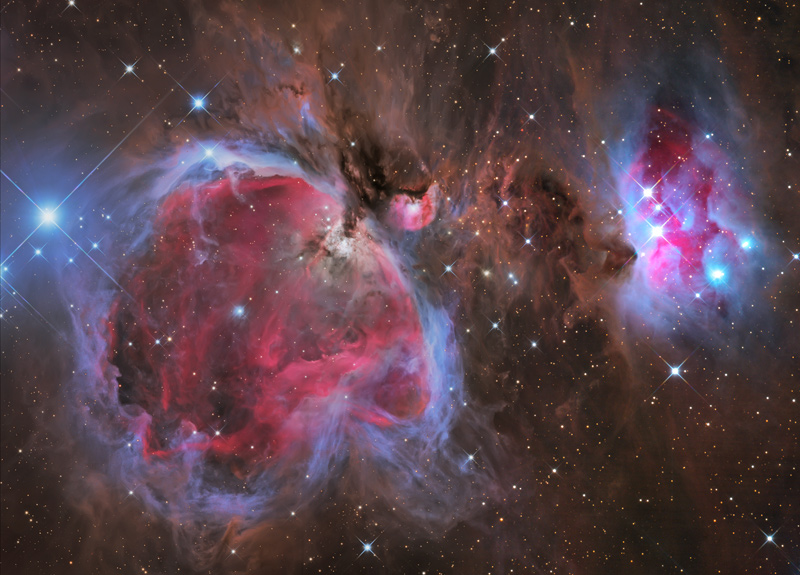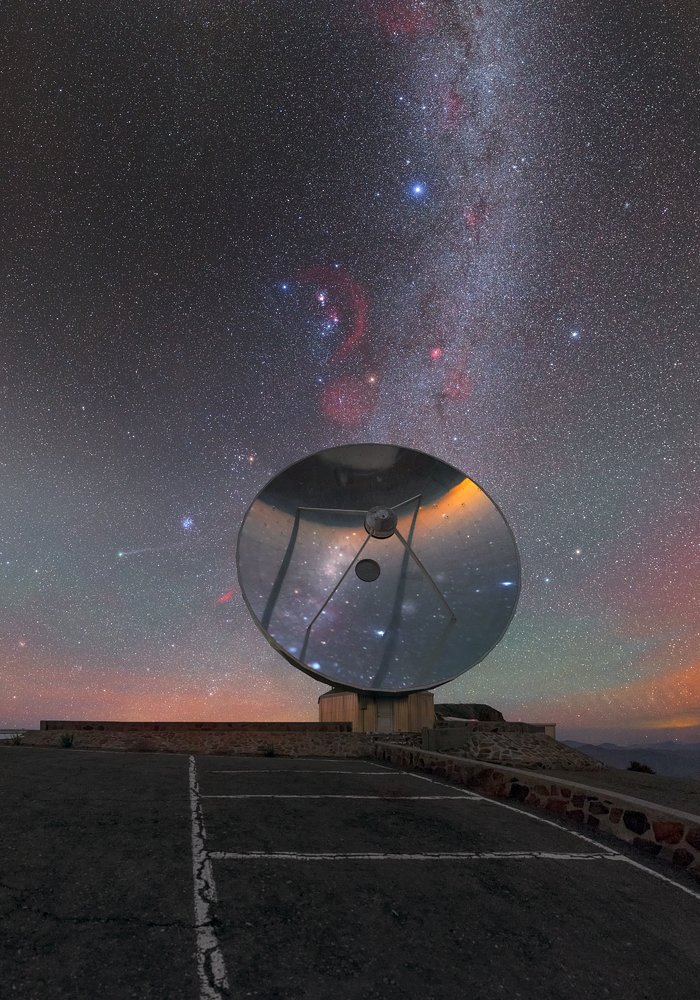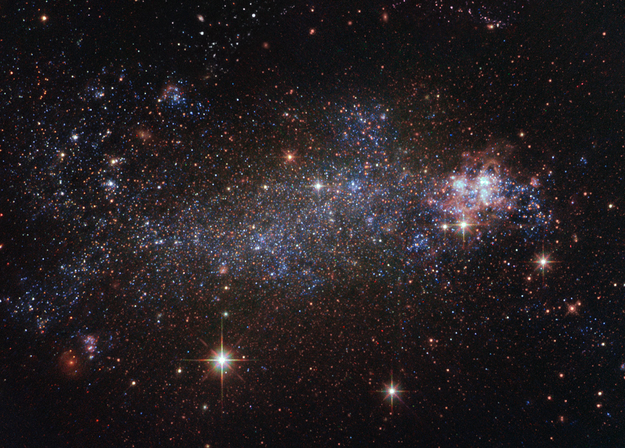Page 1 of 2
Found Images: 2018 November
Posted: Thu Nov 01, 2018 3:29 pm
by bystander
Have you seen a great image or video somewhere that you think would make a great APOD? Nominate it for APOD! Please post as much information here as you have about the image/video with a link to any source(s) for it you know of here, and the editors will take a look.
When posting the image itself, please do not post anything larger than a thumbnail here; please honor the copyright holder's copyright.
Please keep hotlinked images under 400K.
Thank you!
<< Previously
Re: Found Images: 2018 November
Posted: Fri Nov 02, 2018 1:56 pm
by starsurfer
Re: Found Images: 2018 November
Posted: Fri Nov 02, 2018 2:01 pm
by starsurfer
M83
http://outters.fr/wp/m83-lhargb/
Copyright: Ciel Austral
Processing: Nicolas Outters
Re: Found Images: 2018 November
Posted: Fri Nov 02, 2018 2:03 pm
by starsurfer
Re: Found Images: 2018 November
Posted: Sun Nov 04, 2018 11:06 am
by starsurfer
Tarantula Nebula (NGC 2070)
http://www.astrophoton.com/NGC2070.htm
Copyright: CEDIC
Processing: Christoph Kaltseis
Re: Found Images: 2018 November
Posted: Mon Nov 05, 2018 12:56 pm
by starsurfer
Re: Found Images: 2018 November
Posted: Mon Nov 05, 2018 12:57 pm
by starsurfer
ESO: A Lonely Little Telescope (SEST)
Posted: Mon Nov 05, 2018 3:51 pm
by bystander
A Lonely Little Telescope
ESO Picture of the Week | 2018 Nov 05
This once-busy eye on the sky now gazes wistfully into the heavens from its mountaintop home. Located at ESO’s
La Silla Observatory in Chile’s
Atacama Desert, this is the dish of the now-retired Swedish-ESO Submillimetre Telescope (or
SEST for short).
The SEST was decommissioned in 2003 to make way for the Atacama Pathfinder Experiment telescope (
APEX) and the Atacama Large Millimeter/submillimeter Array (
ALMA), both of which sit on the Chajnantor plateau in Chile’s Atacama region (as their names suggest). In its day, the SEST was the largest
sub-millimetre telescope in the southern hemisphere; it notably broke new ground in the study of some of the coldest regions in the Milky Way, where
stars are just beginning to form from cosmic gas and dust.
The bright streak of the
Milky Way rises above the SEST in this image. Within this river of light one can, poetically, see some of the huge star formation regions that the telescope helped us to understand. In fact, one can see in this single image almost the whole of the Milky Way visible from this location — part of it in the sky above, and part reflected off the shiny surface of the telescope dish.
This striking frame includes so many beautiful night sky objects that it justifies a whole new annotated version of this photograph — simply
click here to see the locations of everything from the bright stars
Sirius and
Procyon to the
Orion Nebula, the
Cone Nebula, the atmospheric and cosmic phenomena of
airglow and
zodiacal light,
Comet Lovejoy, and more.
The image was captured by ESO Photo Ambassador
Petr Horálek.
HEIC: Feeling Blue (ESO 338-4)
Posted: Mon Nov 05, 2018 4:05 pm
by bystander
Feeling Blue
ESA Hubble Picture of the Week | 2018 Nov 05
This captivating image from the NASA/ESA Hubble Space Telescope’s
Wide Field Camera 3 shows a lonely dwarf galaxy, a staggering 100 million light-years away from Earth. This image depicts the
blue compact dwarf galaxy ESO 338-4, which can be found in the constellation of
Corona Australis (
The Southern Crown).
Blue compact dwarf galaxies take their name from the intensely blue star-forming regions that are often found within their cores. One such region can be seen embedded in ESO 338-4, which is populated with bright young stars voraciously consuming hydrogen. These massive stars are doomed to a short existence, as despite their vast supplies of hydrogen fuel. The
nuclear reactions in the cores of these stars will burn through these supplies in only millions of years — a mere blink of an eye in astronomical terms.
The young blue stars nestled within a cloud of dust and gas in the centre of this image are the result of a recent
galaxy merger between a wandering galaxy and ESO 388-4. This galactic interaction disrupted the clouds of gas and dust surrounding ESO 338-4 and led to the
rapid formation of a new population of stars.
Re: Found Images: 2018 November
Posted: Wed Nov 07, 2018 11:26 am
by starsurfer
Re: Found Images: 2018 November
Posted: Wed Nov 07, 2018 11:28 am
by starsurfer
Re: Found Images: 2018 November
Posted: Wed Nov 07, 2018 11:31 am
by starsurfer
Re: Found Images: 2018 November
Posted: Sat Nov 10, 2018 8:31 am
by Ann
Re: Found Images: 2018 November
Posted: Sun Nov 11, 2018 3:22 pm
by starsurfer
Re: Found Images: 2018 November
Posted: Sun Nov 11, 2018 3:26 pm
by starsurfer
Pacman Nebula (NGC 281)
http://astro-koop.de/?attachment_id=2010
Copyright: Stefan Heutz, Wolfgang Ries and Michael Breite
ESO: Stunning Exoplanet Time-Lapse (β Pic b)
Posted: Mon Nov 12, 2018 6:41 pm
by bystander
Stunning Exoplanet Time-Lapse
ESO Picture of the Week | 2018 Nov 11
ESO's Very Large Telescope (
VLT) has captured an unprecedented series of images showing the passage of the exoplanet
Beta Pictoris b around
its parent star. This young massive exoplanet was initially discovered in 2008 using the
NACO instrument at the VLT. The same science team since tracked the exoplanet from late 2014 until late 2016, using the Spectro-Polarimetric High-contrast Exoplanet REsearch instrument (
SPHERE) — another instrument on the VLT.
Beta Pictoris b then passed so close to the halo of the star that no instrument could resolve them from one another. Almost two years later, after seeming to merge into the image of the star, Beta Pictoris b has now emerged from the halo. This reappearance was captured again by SPHERE.
- The complete series of images, with the bright glow of the star Beta Pictoris blocked out, have been compiled to create a stunning and unique time-lapse of the long-period orbit of Beta Pictoris b.
SPHERE caught sight of Beta Pictoris b by looking at it directly — not by inferring its existence. Most known
exoplanets have been discovered using indirect
methods — observing how they affect a star's
position or
brightness. ESO's SPHERE specialises in a method called
direct imaging, hunting for exoplanets by taking their photographs. This extraordinarily challenging endeavour provides us with clear images of distant worlds such as Beta Pictoris b, 63 light-years away.
Beta Pictoris b orbits its star at a distance similar to that between the Sun and Saturn, approximately 1.3 billion kilometres, meaning it’s the most closely orbiting exoplanet ever to have been directly imaged. The surface of this young planet is still hot, around 1 500 °C, and the light it emits enabled SPHERE to discover it and track its orbit, seeing it emerge from its passage in front of its parent star. Whilst a glance at these images might suggest that the planet transits the star, eclipsing a little of its light, Beta Pictoris b does not in fact quite transit. These images are a remarkable achievement, heralding a new era in one of the most exciting and challenging areas of astronomy — discovering and characterising exoplanets.
HEIC: Of Bent Time and Jellyfish
Posted: Mon Nov 12, 2018 6:52 pm
by bystander
Of Bent Time and Jellyfish
ESA Hubble Picture of the Week | 2018 Nov 11
At first glance, a bright blue crescent immediately jumps out of this NASA/ESA Hubble Space Telescope image: is it a bird? A plane? Evidence of extraterrestrial life? No — it’s a galaxy.
The shape of this galaxy admittedly appears to be somewhat bizarre, so confusion would be forgiven. This is due to a cosmic phenomenon called gravitational lensing. In this image, the gravitational influence of a massive galaxy cluster (called SDSS J1110+6459) is causing its surroundings spacetime to bend and warp, affecting the passage of any nearby light. This cluster to the lower left of the blue streak; a few more signs of lensing (streaks, blobs, curved lines, distorted shapes) can be seen dotted around this area.
This image also features a rare and interesting type of galaxy called a
jellyfish galaxy, visible just right next to the cluster and apparently dripping bright blue material. These are galaxies that lose gas via a process called
galactic ram pressure stripping, where the drag caused by the galaxy moving through space causes gas to be stripped away.
viewtopic.php?t=37366
Re: Found Images: 2018 November
Posted: Tue Nov 13, 2018 5:06 pm
by starsurfer
Re: Found Images: 2018 November
Posted: Tue Nov 13, 2018 5:10 pm
by starsurfer
Re: Found Images: 2018 November
Posted: Tue Nov 13, 2018 5:11 pm
by starsurfer
Re: Found Images: 2018 November
Posted: Wed Nov 14, 2018 12:45 pm
by starsurfer
Re: Found Images: 2018 November
Posted: Wed Nov 14, 2018 12:51 pm
by starsurfer
Re: Found Images: 2018 November
Posted: Wed Nov 14, 2018 2:05 pm
by G.Chatzifrantzis
NGC 6992 The Eastern Veil Ha-Sii-Oiii
Equipment:
OTA : Celestron C11 XLT - Starizona Hyperstar f2 - 560mm FL
Mount : EQ8
Camera : Atik 460ex
Guiding : Stellarvue 80mm - Lodestar X2
Filters : Ha-Sii-Oiii HighSpeed f2
SoftWare :
DSS - Pix - Cs
Exposure :
Ha : 1h
Oiii : 1h
Sii : 1h
Location : City Of Thessaloniki
Re: Found Images: 2018 November
Posted: Wed Nov 14, 2018 4:34 pm
by Ann
NGC 3293 and NGC 3324
Copyright: Gerald Rhemann
http://www.astrostudio.at/1_Deep%20Sky% ... 8e8a914e40
This picture shows the splendid cluster NGC 3293, and the Gabriela Mistral Nebula, NGC 3324.
I have posted it in honor of starsurfer's three thousand two hundred and ninety-third post here at Starship Asterisk*!

Ann
Re: Found Images: 2018 November
Posted: Sun Nov 18, 2018 9:00 am
by starsurfer
Ann wrote: ↑Wed Nov 14, 2018 4:34 pm
NGC 3293 and NGC 3324
Copyright: Gerald Rhemann
http://www.astrostudio.at/1_Deep%20Sky% ... 8e8a914e40
This picture shows the splendid cluster NGC 3293, and the Gabriela Mistral Nebula, NGC 3324.
I have posted it in honor of starsurfer's three thousand two hundred and ninety-third post here at Starship Asterisk*!

Ann
Thanks for that, it's a gem of a cluster!








